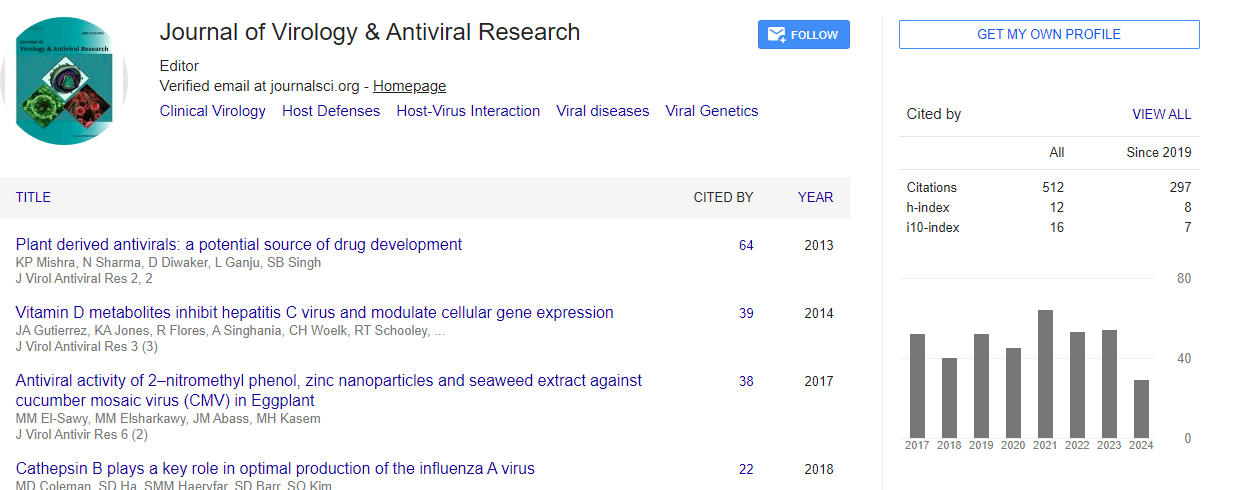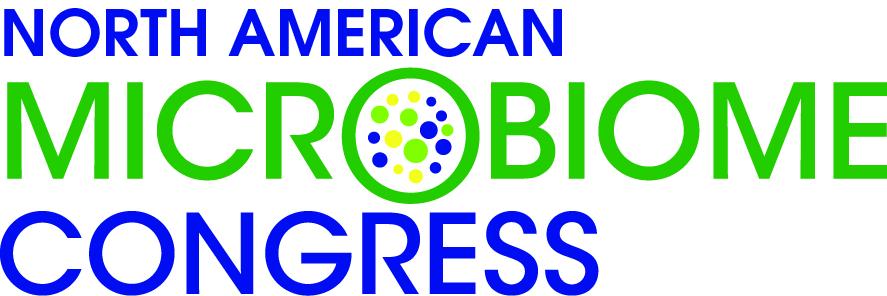Perspective, J Virol Antivir Res Vol: 10 Issue: 2
HIV Co-Infected with Covid-19 Patients with Antibody Responses to Sars-Cov-2
Rumpa Saha*
Department of Microbiology, University College of Medical Sciences, Delhi, India
*Corresponding Author: Rumpa Saha
Department of Microbiology, University College of Medical Sciences, Delhi, India
Email: saharumpa@gmail.com
Received date: 28 February, 2022; Manuscript No. JVA-22-56801;
Editor assigned date: 02 March, 2022; PreQC No. JVA-22-56801(PQ);
Reviewed date: 14 March, 2022; QC No JVA-22-56801;
Revised date: 23 March, 2022; Manuscript No. JVA-22-56801(R);
Published date: 31 March, 2022; DOI: 2324-8955/jva.1000659.
Citation: Saha R (2022) HIV Co-Infected with Covid-19 Patients with Antibody Responses to Sars-Cov-2. J Virol Antivir Res 11:2.
Keywords: Antibody
Introduction
The current pilot investigation aims to examine the IgG antibody response to SARS-CoV-2 spike protein in HIV seropositive individuals co-infected with COVID 19. The spike protein of the SARS-CoV-2 envelope has been proven to be highly immunogenic and is the key target for neutralizing antibodies. This cohort study was conducted in Delhi with HIV-positive COVID-19-infected individuals, who had six consecutive blood samples drawn every 15 days commencing on day 20 after Covid-19 positivity and tested for SARSCoV-2 anti-spike protein IgG antibody by ELISA. In 23.33% of the 30 patients involved in this trial, no unique SARS-CoV-2 spike-binding IgG antibody was found in any of their samples. 70% of the 76.67% of patients who produced COVID-19 IgG antibody seroconverted at 3 weeks, and antibody stability lasted an average of 65 days after infection in these patients. SARS-CoV-2 anti-spike protein IgG antibody sero-conversion and stability in HIV seropositive persons who developed COVID-19 infections are identical to the overall population with COVID-19 infections, starting three weeks after infection and lasting up to 2 months to 4 months. Sero conversion may or may not be related to the disease's clinical severity. However, until 3 months after infection, 23.33% of patients had no detectable specific SARS-CoV-2 spike-binding IgG antibody in any of their samples.
Development of Coronavirus Disease
SARS-CoV-2 infection and the subsequent development of Coronavirus Disease 2019 (COVID-19) pose a serious worldwide health care concern. The laboratory diagnosis of infected individuals, as well as the assessment of immunity to SARS-CoV-2, is a critical component of the pandemic's management. The identification of viral RNA and the measurement of antibodies of various isotopes against SARS-CoV-2 components, which represent the host immune response, are the two cornerstones of laboratory testing. The serological response is not suitable for early detection of infected patients, despite the fact that antibodies form early in the course of the disease.
The SARS-CoV-2 envelope's Spike Protein (SP) has been demonstrated to be highly immunogenic and is the primary target of neutralizing antibodies. By day 14 after symptom onset, 95%-100% of COVID-19 patients have IgG antibodies to the SARS-CoV-2 envelope's spike protein, including antibodies to the SP's ReceptorBinding Domain (RBD), which strongly correlate with antibodies that neutralize viral replication in cell cultures (Neutralizing Antibodies NtAb). However, some persons who tested positive for the molecular test did not have measurable amounts of protective IgG antibodies, according to research. Furthermore, even in hospitalized individuals, neutralizing antibodies were low or absent. This condition calls into doubt protective immunity as well as patient’s ability to develop an antibody response.
Because there is a paucity of published academic study on SARS CoV-2 confections in HIV-positive patients, nothing is known about the clinical and epidemiological consequences in these patients. It's unclear whether the dearth of published data is related to a lack of HIV-CoV-2 screening, or if the SARS CoV-2 is just not found commonly in HIV-positive patients. During the present coronavirus pandemic, this lack of knowledge is a worry in countries with high HIV cases, particularly in Sub-Saharan Africa, where 70% of HIVpositive persons live. HIV knowledge demonstrates that the virus targets and kills the immune system, causing certain antibody responses to be delayed or even absent, resulting in the disease's protracted course. Except for a few isolated case reports and case series, the literature lacks studies concentrating on immunological response in HIV-positive patients who are also co-infected with COVID-19. In light of this, the current pilot study aimed to assess IgG antibody levels to the SARS-CoV-2 spike protein in HIV-positive patients who were also co-infected with COVID-19.
The goal was to use an ELISA-based kit to determine the IgG antibody response to SARS-CoV-2 SP in HIV-positive individuals who were also co-infected with COVID 19, as well as to determine the timing of presence and disappearance of this antibody in these patients. SARS-CoV-2 antibody levels were likewise linked to CD4+T-cell counts and HIV and COVID-19 severity in this investigation. After receiving institutional ethical committee permission, this cohort study was conducted in the department of microbiology and ART clinic at a tertiary care hospital in Delhi over the course of four months. All participants/caregivers provided written informed consent and assent (where relevant) (for children). The study comprised HIV-positive patients of all ages, both sexes, who were infected with COVID-19 as demonstrated by a positive RT-PCR or Rapid Ag test for Covid-19. The sample size could not be calculated because this was a pilot study. Patients on immune modulators or prolonged steroids were excluded from the study.
Immune Modulators Symptoms
Mild: Mild symptoms such as fever, cough, sore throat, nasal congestion, malaise, and headache may occur in patients with an uncomplicated upper respiratory tract infection, but there is no indication of dyspnea or hypoxia (normal saturation). Covid Care Centre (CCC/at home) is in charge of the care.
Moderate: Pneumonia with no evidence of severe disease, dyspnea and/or hypoxia, fever, cough, and a SpO2 of 94% on room air, as well as a respiratory rate of 24 minutes. Fast breathing in children (in breaths per minute): 2 months 60; 2 months-11 months 50; 1 year-5 years: 40. Covid health center is in charge of the management DCHC.
Severe Pneumonia: Clinical symptoms of pneumonia plus one of the following: Respiratory rate 30 breaths/min, acute respiratory distress, SpO2 90% on room air in an adolescent or adult. Coughing or trouble breathing in a child, including at least one of the following: cyanosis central or SpO2 90%; significant respiratory distress (e.g., grunting, chest in-drawing); indications of pneumonia with any of the following warning indicators: Convulsions, inability to nurse or drink, lethargy or unconsciousness other symptoms of pneumonia include: 2 months 60; 2 months-11 months 50; 1 years-5 years 40; chest in drawing, quick breathing (in breaths/min). DCHC is in charge of the management.
All samples were acquired using standard precautions and Personal Protective Equipment (PPE) (as necessary). After the study was completed, the waste samples were disposed of according to biomedical waste management guidelines. Patients who are HIVCoV-2 confected seroconvert in a similar time frame to those who are not HIV-CoV-2 confected. The ability of HIV-positive individuals to establish natural immunity to SARS-CoV-2 bodes well for a successful response to COVID-19 vaccinations, while literature suggests that a drop in resting memory cells may reduce Ab generation. Sero conversion may or may not be related to the disease's clinical severity. Anti-spike antibody stability in these individuals is similar to that of the general population, with COVID-19 individuals lasting up to 3 months-4 months. Hypertension and hyperlipidemia were the most common co-morbidities, although whether comorbidities enhance mortality in AIDS patients have yet to be determined.
 Spanish
Spanish  Chinese
Chinese  Russian
Russian  German
German  French
French  Japanese
Japanese  Portuguese
Portuguese  Hindi
Hindi 

